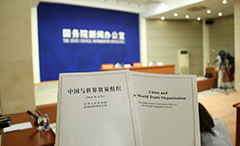Further opening-up in tandem with WTO
2018-07-03
China Daily
The State Council Information Office released a white paper on June 28, giving a full account of China’s fulfillment of its commitments to the World Trade Organization, including advancing higher-level reform and opening-up, supporting the multilateral trading system and contributing to the world economy. It was reiterated by Zhong Shan, minister of commerce, in his commentary on People’s Daily on July 2.
China fulfilling its WTO commitments, confirmed by the WTO time and again, and its remarkable contributions to global economic development apart, the most impressive part of China’s achievements is the correct and resolute decisions it has made to facilitate the rapid growth of trade and economy over the years.
The complicated and precarious world economic and trade situation over the past two years further confirm the greatest achievement of China since joining the WTO in 2001 is its success in seizing the rare window of opportunity and time to boost its economic development.
Now that China is taking the initiative to further advance opening-up and carry out the “second revolution”, it is hoped it shows the same courage as it did when it bid for WTO membership. And all the decisions of the Chinese government should be in the interest of the Chinese people, and to maintain and enhance the country’s interests.
China knows it cannot rely on its own resources alone to advance its industrialization. As a result, it is willing to seize development opportunities overseas and share its experiences and economic gains with its trading partners through imports and foreign direct investment. But it also knows its biggest contribution to the world would be to do a good job at home and ensure stable and sustainable economic development —and hope that its goodwill wins fairer treatment for its personnel, goods and capital abroad.
That China’s decision to join the WTO was absolutely right is reflected in the sharp increase in its foreign trade and global status. In 2001, China’s goods export was $266.1 billion, or 4.3 percent of the world’s total, ranking sixth in the world. But by 2004, three years after joining the WTO, China had exceeded Japan in goods export. It overtook the United States in 2007 and Germany in 2009 to become the largest exporter of goods. By 2015, its export volume had increased to $2.27 trillion, or 13.76 percent of the global total —in comparison, the export volume of the US, which ranked second, was $1.5 trillion.
Without WTO membership, it would have been impossible for China to make such achievements. Despite a slight decline in its share of global goods trade over the past two years, China still leads the world. More important, it is expected to remain the world’s largest goods exporter for a long time to come.
China’s manufacturing and goods trade developed at an unprecedented pace because it capitalized on the opportunities offered by almost a decade-long robust growth of global trade since its accession to the WTO. As a latecomer to economic development, China prepared for the WTO membership by laying a solid industrial foundation, judiciously using human resources, building excellent infrastructure, an improving governance. This preparedness helped China to make full use of the decade-long window of opportunities offered by booming global trade.
If China had not joined the WTO and, as a result, missed the rare window of opportunities, it would not have achieved the unprecedented economic growth.
Now, some of the favorable conditions for the economic growth of developing countries are on the wane thanks mainly to the rise of trade protectionism and unilateralism in some parts of the world. Donald Trump’s election as US president and a series of actions he has taken have created chaos in the global trading system.
An increasingly inward-looking economic approach adopted by the US administration may not blunt China’s competitive edge in global trade and the world economy. But the unfavorable developments will make it more difficult for many developing and less-developed countries to emulate China’s export-led economic growth model to expedite their economic development. Which is a pity.
Because of the conditions imposed on China for joining the WTO, other WTO members have been able to take protective measures against Chinese products because China’s “market economy status” has been denied. However, the accession to WTO won China a golden period of rapid development.
Nowadays, China is once again facing pressure from trade protectionism, which is a double-edged sword. Although it may lead to unfair treatment to Chinese products and enterprises abroad, it will strengthen healthy domestic competition and make domestic industries more vibrant and competitive.
By further advancing reform and opening-up, China can also rein in some vested interest groups and eliminate its zombie enterprises. Therefore, this is another golden opportunity for China to turn challenges into opportunities within the WTO framework.


